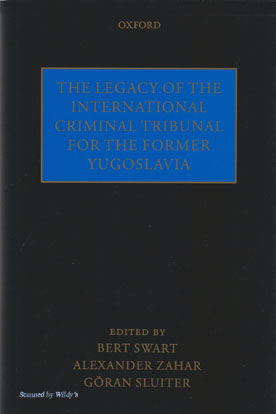
The International Criminal Tribunal for the Former Yugoslavia (ICTY) was established in 1993 and is due to complete its trials by 2011. Easily the most credible and prodigious of the international tribunals established in this period, the ICTY is by far the most important source of case law on international criminal law.
This is reflected in the citations it receives by other courts and by learned commentators. Long after its dissolution, the ICTY will most likely serve as an important frame of reference for the International Criminal Court and other courts dealing with international crimes, including national courts.
The publication of this book coincides with the year of cessation of trial activity at the ICTY. Its purpose is to mark this significant milestone in international law with a series of in-depth, critical reflections on the institution's legacy by eminent scholars and practitioners.
In the course of seventeen chapters, the contributing authors analyse the main features of the ICTY's work in an unprecedented examination of the institution's legitimacy, core principles, methodologies, unstated assumptions, political circumstances, and impact-and indeed, its legacy.